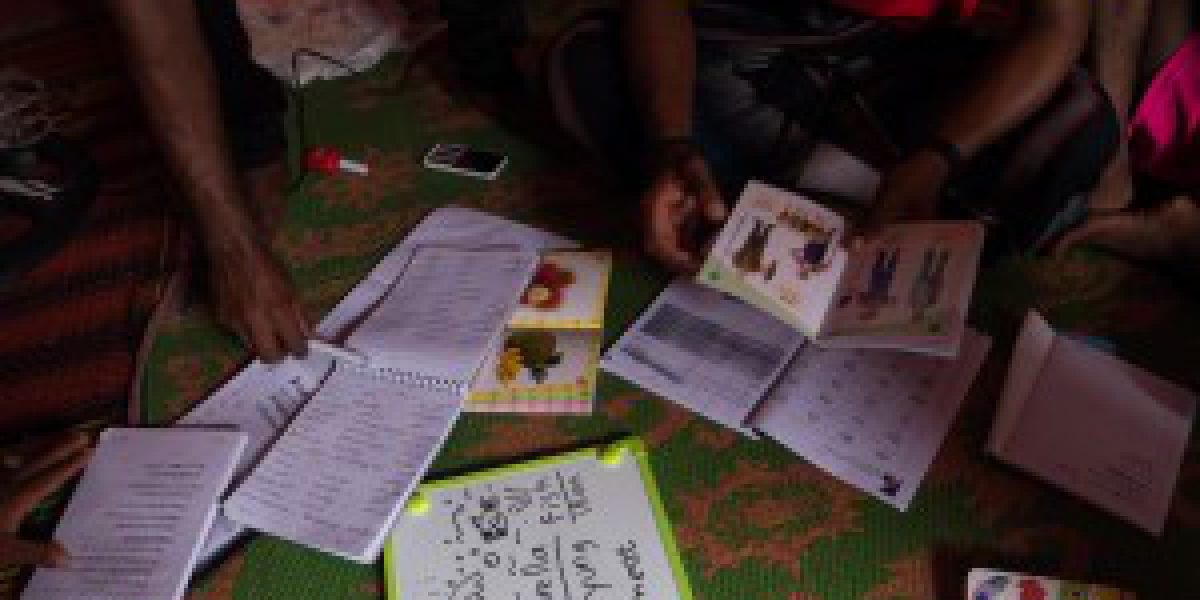Indonesia- Accompaniment : Encountering Those Forsaken
13 June 2016

It was 10:35 am in the morning, Bayeun Village refugee camp in Aceh Timur started to become alive. Rohingya refugees had started their activities. Some teenage refugees gathered in one of the classrooms to begin their English session, whilst a group of children in one corner of a semi permanent wooden building began their play and study sessions with some NGO volunteers. At the other corner, some female refugees and their children sat in a circle with other volunteers. Yet another group was sitting under the trees talking. These were common impressions of the situation in this camp.
After visiting for several days and observing the refugees’ activities, I noticed a teenage boy sitting alone in a tent, while his friends were outside. I was so curious, so I went to see him. “My name Mohammad Hasan,” he introduced himself. Looking shy and unconfident, he answered my questions with inarticulate Indonesian. “Saya no like study, saya hari-hari duduk di sini. Sore hari saya play football (I don’t like studying, I sit here every day. In the afternoon, I play football)”. During my early days here I had never seen him joining his friends in classes.
I couldn’t believe Hasan didn’t like studying. I tried to find out why he was reluctant to join his friends in studying English or other subjects. One day, I finally got the answer. “Brother, I don’t like study, I’m embarrassed. I can’t read, I can’t write,” he answered when I urged him to tell me why.
After observing for few days, I realized Hasan was not the only one. There were also Rofik, Mohammed Aziz, and Armin who were just sitting around during the study time. They felt discouraged to join the classes for being illiterate.
Then an idea came to me, to do a special and personal intervention for them. I asked my friends to accompany Hasan and the other boys to learn how to read and write. From meeting to meeting we could see they were getting more excited to learn.
One and a half months later, Hasan looked different. He seemed more cheerful and confident. “Brother, now I can write my name. This is father, this is mother, and this is my sister”, Hasan wrote his parents’ and sibling’s name on a small white board. I complimented him with a big smile on my face.
Hasan is a symbol of forgotten refugees, those left behind. While some refugees get up and join activities, there are some out of sight. Those who are afraid to show themselves, those who are shy and unconfident, they’re the ones who need intervention.
While most people choose to pay attention to those who can be seen, we should look out and pay more attention to those invisible. In addressing big needs when caring for people, there are often some small aspects out of our sight. In ensuring no one is forgotten or left behind lays the real value of genuine accompaniment.
Since their arrival in May 2015, much support has been provided to the Rohingya arrivals in Aceh by the local and international community. In an euphoric outpour of sympathy and welcome for the Rohingya guests communities, local and national government were moved to helping them.
As time goes by, the waves of assistance provided for the refugees still continue. Not less than 18 local, national, and international organizations, in cooperation with local governments, are doing their part to help refugees; UNHCR, IOM, JRS, Save The Children, Dompet Dhuafa, PKPU, Insan TV, Sheep Indonesia Foundation, Peduli Muslim, Red Crescent Indonesia, ACF, CMC, Roja TV, MSF, As-sunni, MDMC, Geutanyoe Foundation, BPBD, Tagana, and Aceh Timur District and Langsa City government, and Immigration Office are working together in helping the Rohingya refugees.
This is a very interesting phenomenon,as it is different to the common response to refugees in Indonesia. Asylum seekers and refugees are usually tended to only by Immigration, UNHCR and IOM who have a direct mandate from or agreement with the Indonesian government. The response to Rohingya refugees and Bangladesh immigrants in Aceh involved local authorities, humanitarian agencies, and community groups collaborating together in a Rohingya Task Force organized by Aceh Timur District and Langsa City government, providing the space for many parts of society to participate, expressing a commitment and concern on refugee and asylum seeker issues. But the involvement of many parties needed proper management and guidelines addressing mis-communication, coordination and overlapping in services, conflict of interests, or even how to avoid jealousy by the local community. Based on this experience, it was necessary to establish guidelines for community based humanitarian care for refugees. Guidelines based on these experiences are currently combined by Sheep Indonesia Foundation and will be published in the coming months.
As much material support was provided by generous organizations, JRS chose to focus on supporting the coordination of responses as well as increase the understanding on who the Rohingya are, their status as refugees and asylum seekers in conducting public awareness activities, such as talk shows on local radio. Public discussions with government officials were facilitated by some NGOs (Geutanyoe Foundation, SCF, and Sheep Indonesia Foundation) inviting JRS to share about our understanding and experience in accompanying and serving refugees in other parts of Indonesia.
Following the principle to ensuring no refugee is left behind and no aspect is forgotten, JRS focused its support on assisting coordination, addressing emerging gaps and those forgotten, sharing information and supporting others in outreach to the local community and to the Rohingya refugees aiming to improve understanding about cultural differences.
*Names have been changed to protect identities.
* Original article on JRS Indonesia website.


